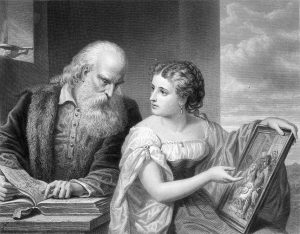Challenging Religious Beliefs – First Workshop Summary
On May 22nd, 2016, the FFRFMCC held its first discussion workshop on “Challenging Religious Beliefs” at the Ethical Humanist Society of Chicago. The purpose of this series of workshops is to assist non-theists as they engage with people of religious faith with topics or questions on subjects relating to belief versus non-belief in a supreme god.
Keep up to date with our events by becoming a member to receive special emails and quarterly newsletters. You can also follow us on Twitter @FFRFMCC, Facebook, or subscribe to this blog for non-member events and news.
Topic #1:
“Science and religion are definitely compatible.
One can believe in both evolution and a created universe from the hands of God.”
Optional Approaches
A) layout the differences between scientific and religious approaches to knowledge
Science is a way of thinking about the universe; it is not an answer but an approach. Students of science look at the evidence around them and make conclusions that are open to rebuttal and need to be defended. As evidence shifts, so must the conclusions. Science provides a framework for determining the most likely truths about the world in which we live. Religion is something that people use as a common language to describe and explain the world–as a body of knowledge with answers. It often is the answer that people are looking for because it fills the gaps that science has yet to fill concerning knowledge about the universe, morality, and communities. The difference between science and religion is that science requires evidence and skepticism. Requires it. People who are religious also claim that they use evidence, citing the beauty of the world and the miracles that they witness, but religion requires a leap of faith at some point in the chain of weak and often post-hoc evidences. To believe without evidence is to lack skepticism which is at odds with the empirical approach to knowledge that science takes.
B) If the belief is focused on a god, determine what sort of god and point out contradictions between beliefs necessitated by that god and beliefs about the natural world as currently held in scientific communities.
First ask their believing opponent for a definition of God – e.g., is God both omniscient and omnipotent? And if the respondent agrees that God is both, then it is important to point out the contradiction of something being both omniscient and omnipotent. The contradiction being that if something is all knowing of everything that will happen in the future, then how could that being also have the power to change the future? If God is responsible for all creation, and knew exactly how that creation would occur, that in itself is contradictory to the fact of evolution. Evolution by definition is an adaptation to changes in the natural world to ensure survival. If God himself is influencing these changes, can we really call it “natural evolution?” And if God began the process of life, which then evolved naturally without God’s influence, how could God know what the results were going to be?
Because so many different religions exist in the world, and all have their own creation stories, the non-theist should ask theists why they believe their story is the true one. This can be accomplished by educating people who hold to a specific religious faith what other religions believe regarding creation. And then ask, “What makes your creation story more true than this one?”
Conclusions
A) What the group agreed upon is that there are millions of people (billions, perhaps) who go about their day within a scientific framework, and go home or take a break, and believe in the supernatural. It does not appear to be a conflict for people in general to live according to a set of rational rules but to also have irrational beliefs. When confronted with this paradox concerning strongly held beliefs, people simply claim that there is a place for reason and a place for faith, so the two can live in harmony within the same individual if compartmentalized despite the contradicting approaches to knowledge.
B) Non-theists should ask those of religious faith who believe in both God and evolution, how it is they can reconcile the highest form of life coming first in the evolutionary process. Evolution, by its structure, is a “Bottom-Up” process, where life begins in its most primordial form, and adapts and works its way up to more complex species. Intelligent design on the other hand, suggests the process is “Top Down,” claiming the highest form of life came first, and then created all other lower forms of life. Since modern science has proven many of the claims about creation in the Bible to be false, the more science reveals each day about the universe, the less significant God’s hand in creation becomes.
Topic #2:
“How can a person be moral, or even find purpose in life, if they do not believe in God?”
Optional Approaches
A) Argue why morality is not absolute and therefore does not require a belief in a god to dictate morality
We agreed that the concept of right v. wrong is not black and white. The context of the situation plays a large part, as does the culture within which the question is posed. The example that came up was whether it was moral to spend $250 on a new suit, knowing that the $250 could feed multiple children in an African country facing drought and famine. We would all like to help others, but feel OK with occasionally purchasing a new suit.
B) Moral systems like Karma can be described in non-supernatural ways
There was a vibrant discussion on whether it was OK for a rationalist to buy into the Karma principle. The argument for Karma focused on the concept that we shouldn’t do good because of a god but because if one does good, it increases overall good, which will increase the odds of good returning to the original good doer. In other words, if multiple individuals do good things, then they are more likely to have good things happen to them. Those against the concept did not like the notion of a force that somehow rewarded people who did good things. What is interesting is that even within a group of secular people, debate continues about something like Karma.
C) Empathy is natural and is a basis for what we have created to be morality
Empathy can be widely seen in many other species in the animal kingdom. Domesticated dogs are a perfect example with their desire to protect and take care of their masters. Many different species of mammals, especially primates show definite empathetic and moral qualities. Yet there is no evidence of religiosity among other animal species. Many civilizations arguably lived morally, as a result of the need to help their tribe or community thrive, long before many of the religions of today were formed.
D) If non-theists are necessarily amoral, then where is the disproportional incarceration of non-theists?
It should be asked of those who believe God and morality are tied together, if they feel that we nonbelievers are all amoral because we don’t believe in God. If this is the case, why is it then that amorality and unethical behavior (i.e., crime, violence, infidelity, divorce, alcoholism and drug use) are greatest in the states with the highest degrees of religious belief? Why is it the percentage of people serving in correctional facilities is proportionally higher among the religious demographic than the non-religious demographic? If the religious admit that non-theists can be decent and moral, and have just as must chance of getting to heaven as they do, what reason is there then to actually worship a god? If not, does that mean God cares more about submission to him rather than morality? Where would that then place God on the moral scale?
E) How can God allow evil?
A good strategy for non-theists on this point is to quote the Epicurean Paradox: If God is willing to prevent evil, but is not able to, then He is not omnipotent. If He is able, but not willing, then He is malevolent. If He is both able and willing, then whence cometh evil? If He is neither able nor willing, then why call Him God? Non-theists should also ask the religious as to how they actually define “good” and “evil.”
Conclusions
We all agreed that religion is not necessary to be moral. When confronted with the question of where morality comes from, if not religion, there was a slew of answers, some of which included
– Education
– Community
– Within oneself
– Evolution
– Parents
– Empathy
Overall, the group agreed that morality existed before religion spelled out commandments and that it spans across religions and cultures. It is a relative term that must be respected within a context and within the framework of a relative right v. wrong world where the best rules of morality should be derived from a mass of people who are open to discussion and debate.





